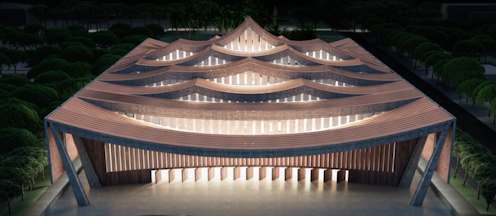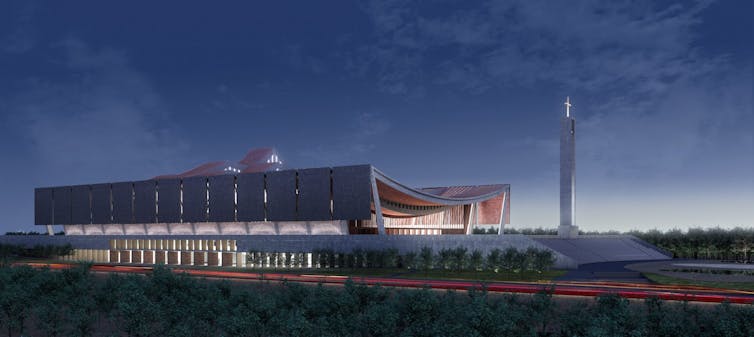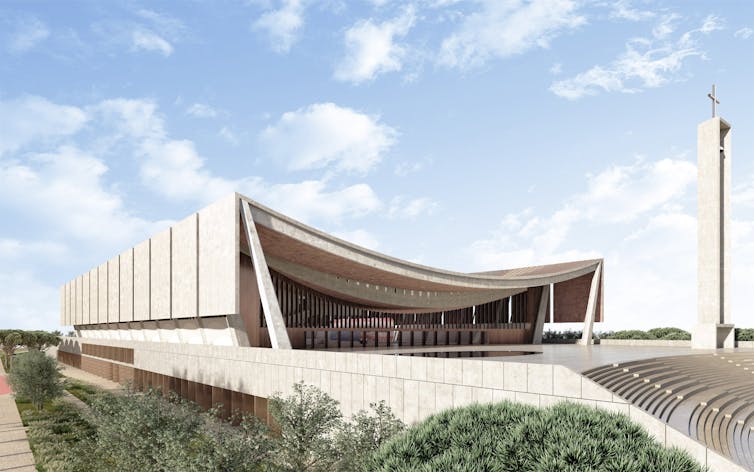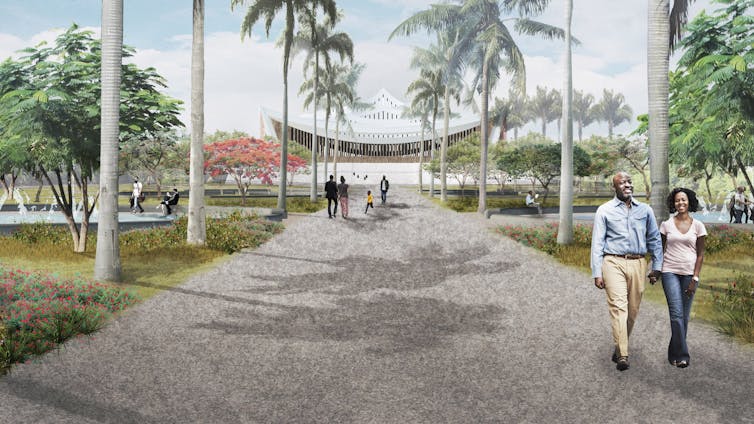
The building of Ghana’s spectacular $400 million national cathedral designed by famed architect David Adjaye has stalled amid an economic crisis. The plan has drawn sharp public criticism but the president says it will be a significant tourist attraction and should go ahead. We asked two experts: Frederick Dayour heads his university’s department of tourism and hospitality where Francis Kofi Essel lectures in tourism. Essel is also a registered tour guide with intimate knowledge of Ghana’s religious sites and their tourism potential.
What will be on the proposed new site and who will visit it?
The National Cathedral of Ghana
will serve as a unifying monument around which to elevate shared conversations on the role of the Christian faith and values in nation-building.
It will contain several features. These include: a 5,000 permanent-seat auditorium, a baptistery chapel, a conference centre, a grand ballroom and restaurant, a music and choir area, a national crypt, as well as recreational gardens and flexible event space.
Globally, visiting religious destinations and sites for pilgrimage by religious faithful and tourists has gained recognition. For instance, Muslims embark on Hajj to Mecca, Christians go to Jerusalem or The Vatican, and Buddhists go to Lumbini in Nepal. The governments of these countries have developed their destinations in response to the influx of these travellers. The countries have been able to exploit the economic benefits of religious tourism. Therefore, for those countries, religious tourism is an export “commodity” raking in revenue from other nationals.
In Ghana, Christians constitute about 71.2% of the population followed by Muslims (17.6%). Ghana is the third most Christian-dominated country in west Africa after Liberia and Cape Verde.
Ghana has many religious sites that attract thousands of tourists and excursionists annually. These sites include forts and castles along the coastal belt; the Wesley Methodist Cathedrals in Accra, Kumasi and Cape Coast. Other Christian attractions include the Pentecost Convention Centre in Kasoa; Nandom Catholic Basilica in the Upper West Region; and Our Lady of Seven Sorrows Basilica in Navrongo.

The country is also home to notable historical Islamic monuments. These include the Tamale Central Mosque; Larabanga Mosque in Damango; and Nakore Islamic Mosque in the Upper West Region.
There are also significant traditional worship sites. These include the Klikor shrine in the Volta region; Akonnedi shrine in the Eastern Region; and Tenzug shrine in the Upper East Region. Most of these sites endear themselves to domestic religious worshippers. The new cathedral, if completed, would complement the existing religious offerings. It could also have an appeal to international pilgrims.
Why has this cathedral divided public opinion?
The proposed National Cathedral of Ghana has divided public opinion and faced stiff opposition. Some Ghanaians are of the view that it was the president’s personal pledge to God. As such, it should be funded by the president – not with taxpayers’ money.
President Nana Addo Dankwa Akufo-Addo made a pledge to God to construct a national cathedral upon becoming president. But this has since become a national pledge. National resources are being used to finance the construction. This was not the initial understanding by most Ghanaians.
Some politicians have also argued that siting the cathedral at its present location was reckless. The decision has resulted in the demolition of private and national assets. These include the scholarship secretariat, passport office, judicial training institute, residence of the Malian Ambassador, and offices of African Centre for Economic transformation.
The project is estimated to cost about US$400 million. The price tag includes the cost of demolition, relocation of the affected facilities, and other compensations.

There is also a general concern about how funds have been used thus far. Politicians are blaming the Cathedral Secretariat of lacking accountability. Ghana’s parliament is to commence investigations into matters surrounding the construction of the cathedral. The project has stalled due to a lack of funds. Many have also called for the suspension of the project because of Ghana’s current economic crisis.
What are the cathedral’s economic benefits?
Tourism is an important contributor to the country’s gross domestic product (GDP). It’s currently the fourth highest foreign exchange earner for Ghana after cocoa, gold and oil and gas. Therefore, the construction of the cathedral and the ancillary services that will come with it are likely to create job opportunities (direct and indirect) and generate revenue for the country and service providers.
Direct sources of revenue for the country will include: entrance fees; taxes paid by the employees of the facility; conference facility hiring fees; and charges paid by private service providers within the facility among others. Again, apart from the temporary jobs that will be created for architects, constructors, engineers, and consultants during the construction phase, many economic activities and job opportunities will result from the completion of the project.

The facility will also create direct jobs for: facility managers; site guides; curators; security; gardeners; cleaners; and administrators to mention a few. The cathedral has the potential of creating direct jobs in the hospitality business too such as hotels, food and beverage, transportation, events, and travel and tour operations.
Indirectly, businesses that provide services along the value chain will also benefit economically. In short, the cathedral will emit many economic benefits to the government, operators, and employees.
So, is building the cathedral a good idea?
It is the vision of the Minister of Tourism, Culture and Creative Art to make tourism the top foreign exchange earner for Ghana. This calls for innovations and diversification of Ghana’s tourism offerings.
If properly established, promoted and managed, the proposed National Cathedral of Ghana could contribute to this dream. The architecture and related services that will come with it will definitely serve to attract domestic travellers and international tourists.
Religious sites are important in the tourism space. But it’s key that the proposed construction of a national cathedral wins greater public support in terms of the funding sources, but also transparency and accountability in the use and management of funds.
The current allegations of financial misappropriation and lack of transparency in the construction process are likely to take away the shine and sanctity of the facility – if it ever gets completed. Consequently, its appeal to would-be religious pilgrims and tourists, in general, may be lost because of current alleged mishappenings surrounding its construction.
Frederick Dayour for SD Dombo University of Business and Integrated Development Studies
Francis Kofi Essel does not work for, consult, own shares in or receive funding from any company or organisation that would benefit from this article, and has disclosed no relevant affiliations beyond their academic appointment.
This article was originally published on The Conversation. Read the original article.







